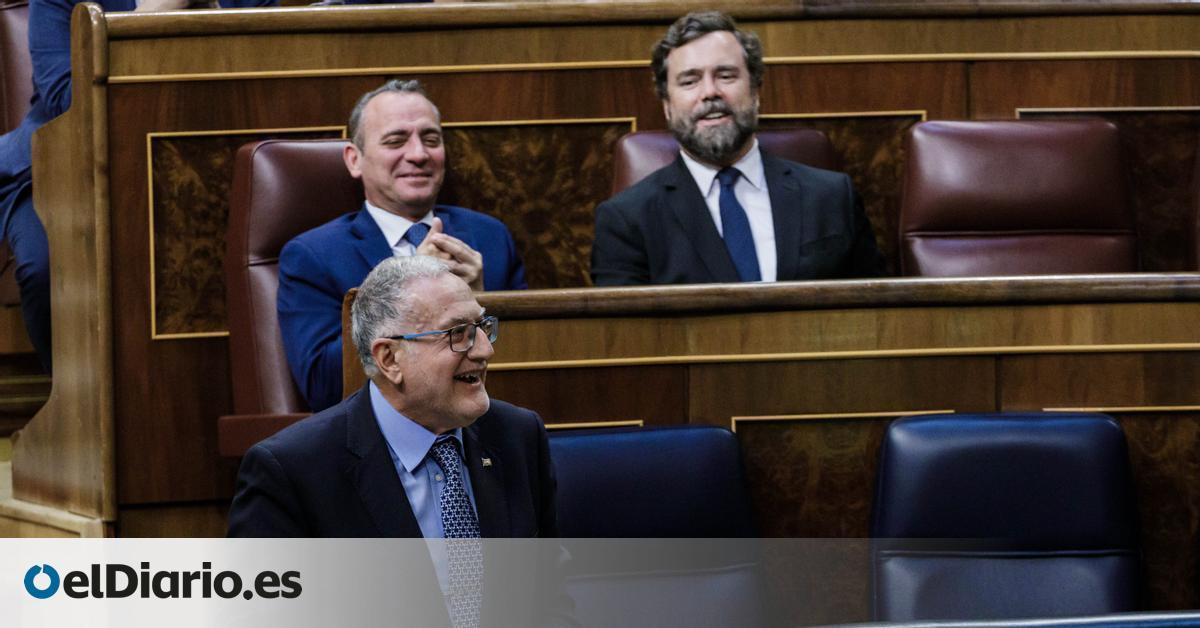
The open crisis of Vox after the resignation of Iván Espinosa de los Monteros has left the entire party knocked out, but the blow has been especially noticeable in the new parliamentary group, greatly diminished after the result of the general elections on July 23. The march of the one who until now has been spokesman in Congress has not only uncovered the internal struggle for power in the extreme right formation, but has also extended to the new team with which Santiago Abascal has to face the next legislature.
Vox pulls from the quarry of its think tanks and its union to renew its candidacies
Further
To begin with, the doctor Juan Luis Steegmann has announced that he will not collect the act of deputy that Espinosa frees and that he also resigns from his positions in the national leadership of Vox. Steegmann was one of the few Vox leaders who publicly defended vaccines against Covid, against the denialist position of the formation –including Abascal who refused to reveal whether he had been vaccinated–, being attacked by some of his colleagues. The doctor is framed in that sector of the party that is “difficult to handle” and with less “integrist” ideas.
The next on the list for Madrid is Carla Toscano, who was number 6 in Abascal’s candidacy for Madrid and stood out in the previous legislature for her furious attacks on the Minister of Equality, Irene Montero, and for her fiery anti-feminist speeches. Toscano set Congress on fire, stating that Montero’s “only merit” was “having studied Pablo Iglesias in depth” and mocked her when she was emotional at an event on the occasion of the International Day for the Elimination of Violence against Women. If she collects her minutes, Toscano will have to combine her work in Congress with her position as deputy spokesperson for the Municipal Group of the Madrid City Council, which she launched after the 28M elections.
The Asturian Figaredo gains strength in the battle as spokesman
The slam given by Espinosa has created a new problem for Abascal: that of appointing a new speaker in the Lower House to face the next legislature in which Vox will play an irrelevant role, given that in the event that Pedro Sánchez manages to be sworn in as president, the leading role as head of the opposition will be taken by Alberto Núñez Feijóo. In addition, after losing 19 deputies, Vox’s capacity for action has been seriously affected. He will not be able to file appeals before the Constitutional Court, nor will he be able to promote a new motion of censure, like the two – unsuccessful – that he has presented in the last legislature, the last one with Ramón Tamames as a candidate. As if that were not enough, the formation has not secured a position on the Congress Table as it has managed to have up to now with Ignacio Gil Lázaro. His permanence in this body depends on the generosity of the PP.
In these circumstances, the name of the new spokesperson is going to be key to knowing the strategy that Abascal is going to follow. At the moment, the one who until now had many ballots to occupy that position was Ignacio de Hoces, the deputy for Badajoz who has just managed to enter Congress promoted by Jorge Buxadé. Hoces, who was an advisor to the parliamentary group, managed to lead the candidacy for that constituency to replace Víctor Sánchez del Real, one of the deputies of that wing considered more “liberal” that is now being laminated in Vox.
Those who know the ins and outs of what is happening internally in the formation assure that Hoces has been running for the position for some time and that Espinosa, whom Abascal had separated from the hard core that makes the decisions – made up of Buxadé and his right arm, Ignacio Garriga; Kiko Mendez Monastery; Gabriel Ariza; Enrique Cabanas and Hoces himself– he was aware of his maneuvers. These sources maintain that the possibility of being replaced by Hoces has been one of the many reasons that pushed Espinosa to make a decision that he had been meditating on for a long time “fed up with intrigues and bypasses.”
But Hoces’ desire to occupy that position seems to have ended up burning him and another of the names entering the fray now is that of José María Figaredo, deputy for Asturias, who was general secretary of the parliamentary group when Macarena Olona jumped into the candidacy of the party in Andalusia to end up giving the fright. Figaredo is a lawyer and has stood out for his denialism against climate change. “The cornerstone of this government’s energy policy, the climate change law, is a suicidal law for Spaniards,” he came to maintain in an intervention in the congressional commission.
However, it is not ruled out that Abascal opts for a woman to be the group’s spokesperson, although some leaders who know the leader believe that he will prefer a man while complaining about the “little weight and influence” that they have within the group. the formation.
The 15 deputies that Vox had have been reduced by half
In fact, among the 33 elected deputies that Vox has brought out on 23J there are hardly any women: eight compared to 25 men. While the rest of the parties complied with parity in their candidacies, the extreme formation backed down in this matter. In these elections only 29% of women were in the first positions of the constituencies compared to 46% in the previous elections. The leadership led by Santiago Abascal opted to place men as headliners in most of the provinces, which has guaranteed their election for many.
In the previous general meetings held in 2019, the parliamentary group had 15 women, of which only a few stood out. One of them was Macarena Olona, who was appointed general secretary of the parliamentary group. But the wake of the deputy for Granada did not last long in Congress. After being appointed in June 2022 as a candidate for the Junta de Andalucía and failing to become, as she aspired, vice president of the Government of popular Juan Manuel Moreno Bonilla, who obtained an absolute majority, Olona left the party amid harsh criticism of Abascal and the leadership. His adventure as leader of the new formation “Caminando Juntos”, with which he appeared at 23J, has also ended up failing.
In Olona’s place heading the list for Granada, Vox placed a man, Jacobo González-Robatto, who served as financial secretary of the Parliamentary Group in Andalusia and between 2019 and 2022 was a senator of the party by designation of this autonomy, going to stop to the Mixed Group of the Upper House. González-Robatto, known in Vox as Coco, He is the son of the former president of the frozen food company Pescanova, and is now one of the 33 members of Vox who has won a seat in Congress while his partner, Paloma Gómez Enríquez, who was second in that candidacy, has been left out.
María Ruíz and Pepa Millán, two figures on the rise
Of the eight deputies elected from Vox, María Ruíz Solás stands out, who was already on the Vox bench in the last legislature but who will play a leading role in the one that will begin, as she has had in the campaign together with Santiago Abascal. Ruíz Solá, who was second in the leader’s candidacy, was a spokesperson for Vox in the Villaviciosa de Odón City Council since May 2015, before the emergence of the party in the Andalusian elections in 2018. Next to her is Pepa Millán, who was advises the Vox Parliamentary Group in Andalusia, specifically in the areas of Employment, Equality, Development and the Presidency and has been a senator by regional designation for this community. The two have entered the deck to replace Espinosa, although with less strength than Figaredo.
Another of the parliamentarians who repeats as deputy for Almería is Rocío de Meer, who was spokesperson for the Committee on Labour, Inclusion, Social Security and Migrations in the previous legislature and also spokesperson for the Committee on Social Rights and Comprehensive Disability Policies. She co-starred in El Ejido in a rally with Abascal and with whom she shared the party’s harsh speech against immigration, stating that “it is not racism to want the parks and squares in which we have grown not to become France.”
The surprise has been the entry of Carina Mejías, formerly of PP and Ciudadanos, whom the party signed as number two for Barcelona behind the veteran Juan José Aizcorbe, known for his ultra past. Mejías was a deputy in the Parliament of Catalonia and spokesperson in the Barcelona City Council with Ciudadanos, a party that she left after acknowledging that she no longer felt identified with the Arrimadas project
Patricia Rueda also follows in her seat for Malaga. Rueda was already in Congress in the XIII and XIV Legislatures, being deputy spokesperson and spokesperson for the extreme right group in the Industry Commission. She is also deputy secretary of the party spokesperson, which has given her media visibility at the press conferences that Jorge Buxadé convenes on Mondays.
Lourdes Méndez-Monasterio also appears on the list of women elected, who has managed to revalidate her seat for Murcia. The parliamentarian is the sister of one of Abascal’s main advisers, Kiko Méndez-Monasterio. Lourdes Méndez was a PP deputy for several legislatures until she began her career with Vox, where she has stood out for her ideas against abortion and euthanasia. In her curriculum, it is noted that she is the mother of six children, although it is not mentioned that she is from Opus Dei. She has also been first deputy mayor and deputy in the Murcia Regional Assembly. In addition, she has held the position of Minister of Labor and Social Policy in the same Community when she was part of the ranks of the PP.
The cast of Vox women in the Lower House is completed by Reyes Romero Vilches, elected by Seville, who was a deputy in the XIII and XIV legislatures, being a spokesperson in the Commission on Social Rights and Comprehensive Policies on Disability; and Blanca Armario González, who will occupy a seat for Cádiz after making the leap to Congress from the Andalusian Parliament, where she was deputy spokesperson. Armario also chairs the Executive Committee of Vox for that province.
Among the ‘falls’ is Mireia Borrás, whom Vox relegated to eleventh place on the Madrid list and has not managed to revalidate the record. The former deputy was signed by Vox for the 2019 elections, but she emerged as a defender of the existence of climate change, against the denialist theories of her party.
Another of the veterans who has not managed to repeat is Inés Cañizares, who was number two for Toledo and was considered close to Espinosa and that more ultra-liberal wing of the party. But there the formation has only won one seat, that of Manuel Mariscal, a leader who has led the area of communication with an iron hand, vetoing the entry of various media to the headquarters of the formation, including elDiario.es.
In the list of deputies who have been left out are, in addition, Georgina Trías, who was headed by Ávila; Teresa López, who was one for Ceuta; Magdalena Nevado, who has not won a seat for Cáceres, and Patricia de las Heras, who has not been elected for the Balearic Islands either.
———————————–
How to stop the lies
The 23J campaign has made clear the tremendous importance of the free press, which depends on its readers and owes nothing to anyone else. The vast majority of the big media are owned by banks, funds and large communication groups. The vast majority of them have whitewashed the ultras and are under the control of the agenda set by the right.
That is why we ask for your support. We need to grow. Hire more journalists. Reinforce our local editions against the lies of the local and regional governments of the extreme right. Sign more investigative reporters. We need to reach more people, build a bigger newspaper, capable of countering the brutal wave of conservative propaganda that we are going to face. And that will leave small what we have experienced in this dirty electoral campaign.
If you care about the future of this country, support us. Today we need you more than ever because our work is more necessary than ever. Become a member, become a member, of elDiario.es.
Source: www.eldiario.es

